09.01.2024
The IT Trends of 2024 According to Gartner
Share

Every year, the leading technology research and advisory firm Gartner predicts the IT trends for 2024. And while everyone knows that AI will be the frontrunner in 2024, there are also other trends to distinguish. In this article, we take a brief look at the ten defined trends by Gartner1.
The trends for 2024 according to Gartner
1) Democratized generative AI
In 2023, we witnessed a significant rise in AI, and this trend will only continue to evolve in 2024. By democratizing artificial intelligence, everyone has access to information, enabling individuals to acquire new knowledge and skills (such as creating images, speech, text, and more). According to Gartner, this is the breakthrough of the decade.
By 2026, more than 80% of organizations will have utilized AI APIs, models, and/or generative AI applications in production environments. In 2023, 14.28 percent of organizations in Belgium utilized AI2 for: analyzing written language (6 percent), automating workflows or decision-making (5.1 percent), and automatic learning such as deep learning (4.8 percent).
Schematic representation of Democratized Generative AI:
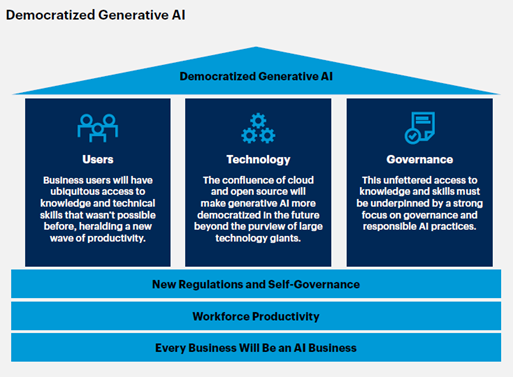
2) AI trust, risk, and security management
A significant trend for 2024 is AI TRiSM, a framework that helps manage security risks and ensures the reliability and safety of AI systems. This ensures that you make more accurate, secure, and fair decisions based on your AI model. These models must be constantly tested through model monitoring, ensuring that the AI models continue to operate as originally intended.
According to Gartner, by 2026, TRiSM will eliminate 80% of incorrect and unlawful information.
Schematic representation of AI TRiSM Technology:
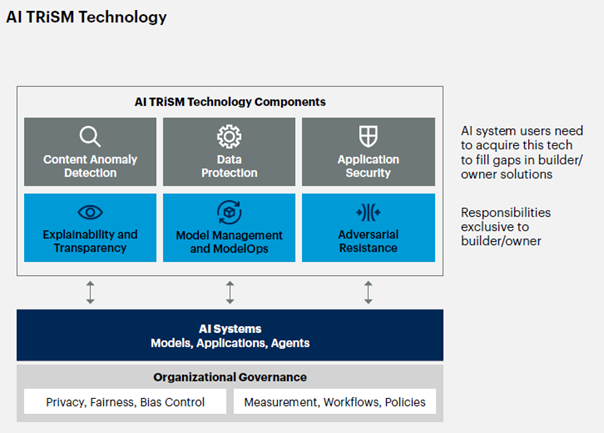
3) AI-augmented development
Advanced AI technologies such as generative AI and machine learning are becoming increasingly integral to the creation, testing, and delivery of applications and platforms. According to Gartner, by 2028, approximately 75% of software engineers in companies will be using AI assistants.
With AI-assisted development tools, you can translate outdated code into modern languages and improve application testing capabilities. This also positively impacts developers' productivity, as they spend less time writing code and can focus on higher-level activities.
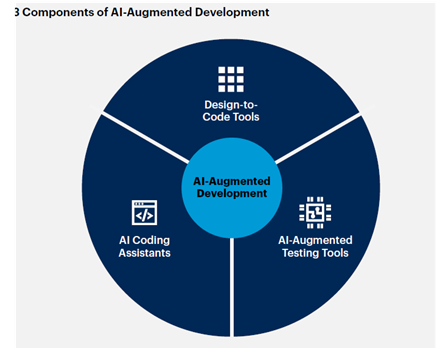
4) Intelligent applications
Gartner defines intelligent applications as applications that autonomously respond to enhance or automate your work. These apps encompass various AI-based services such as machine learning, vector stores, and connected data.
Approximately 26% of CEOs in Gartner's 2023 CEO and Senior Business Executive Survey indicated a need for these apps. This is partly due to many businesses still struggling to fill their vacancies. CEOs identify AI as the technology that will have the greatest impact on their sectors in the next three years.
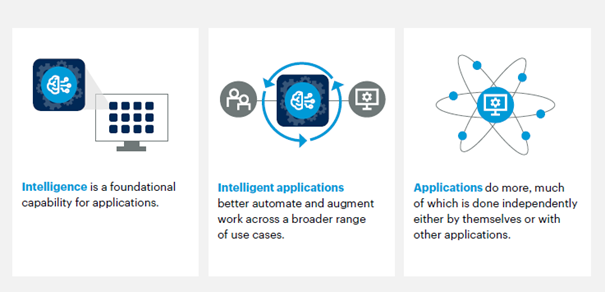
5) Augmented-connected workforce (ACWF)
ACWF integrates augmentation technologies into the work environment to enhance the skills and productivity of employees, as well as business processes and operations. Think of Microsoft's Viva, for example.
Schematic representation of ACWF:
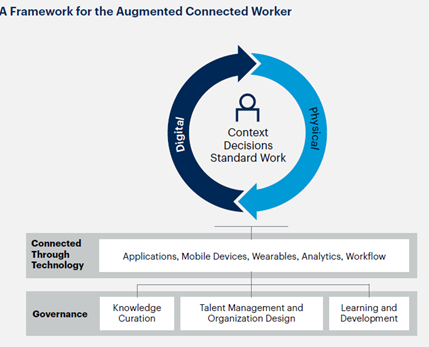
6) Continuous Threat Exposure Management (CTEM)
Continuous Threat Exposure Management (CTEM) enhances the cybersecurity of your organization. CTEM provides a balance between diagnosis and action. It involves various aspects such as scoping, discovery, prioritization, validation, and mobilization (measures to combat the threat or minimize impact). The diagram below illustrates it schematically.
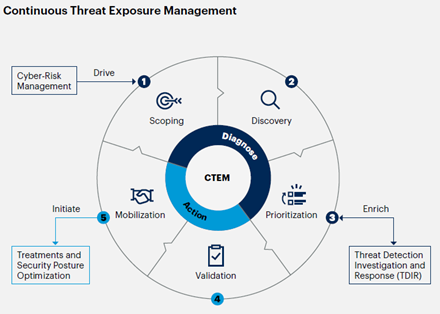
7) Machine customers
Gartner describes machine customers, sometimes also referred to as "custobots," as non-human economic actors capable of making autonomous purchases, such as goods and services. They can act on behalf of humans or autonomously for themselves.
Gartner defines three types of machine customers:
- Bound customer: Human leads, machine executes;
- Adaptable customer: Human and machine jointly lead, machine executes;
- Autonomous customer: Machine leads and executes.
The research firm predicts that by 2028, there will be 15 billion connected products capable of functioning as machine customers. In the following years, Gartner anticipates that this number will only grow into the billions.
Schematic representation of machine customers:
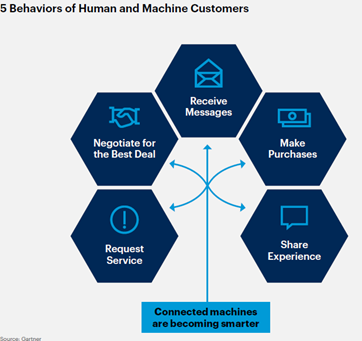
8) Sustainable technology
Every year, there is increasing emphasis on sustainability within organizations. Gartner anticipates that organizations will increasingly opt for technologies that contribute to the sustainability of their operations. Indeed, there are sustainable technologies that aid in achieving environmental goals (such as ESG).
According to Gartner, by 2027, 25% of CIOs will have compensation linked to their impact on sustainable technology.
Framework of sustainable technologies:
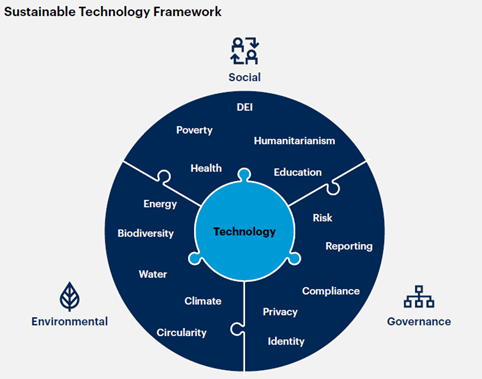
9) Platform engineering
With platform engineering, you design and build toolchains and workflows that enable self-service capabilities for software engineering. There are many benefits to a well-designed platform. Firstly, it reduces cognitive load for your engineers, boosting their productivity. Additionally, it also contributes to greater organizational flexibility.
Gartner predicts that by 2026, approximately 80% of software engineering organizations will establish platform teams.
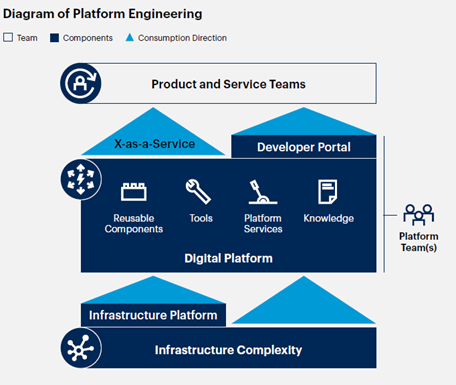
10) Industry cloud platforms
Industry cloud platforms (ICPs) are customized cloud offerings that are specific to particular sectors. With ICPs, you gain more flexibility to respond to the rapidly accelerating disruption in your organization's industry.
An example of an industry cloud platform is the SAP Industry Cloud. This platform offers a range of sector-specific cloud solutions for 25 different industries, including manufacturing, retail, financial services, and healthcare. The solutions are designed to meet the specific needs of each industry and provide functionality for process management, data management, and applications.
By 2027, it's likely that more than 50% of companies will be using industry cloud platforms to accelerate their business operations.
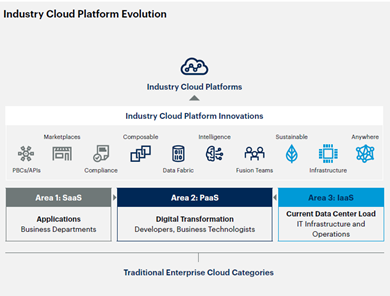
https://www.gartner.com/en/articles/gartner-top-10-strategic-technology-trends-for-2024